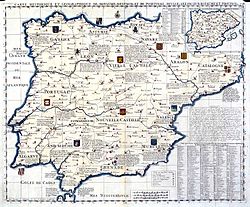This article needs additional citations for verification. (June 2023) |
Kingdom of the Spains and the Indies | |||||||||
|---|---|---|---|---|---|---|---|---|---|
| 1808–1813 | |||||||||
| Motto: Plus Ultra (Latin) "Further Beyond" | |||||||||
| Anthem: Marcha Real (Spanish) "Royal March" | |||||||||
 Spanish territory controlled at some point during the war by King Joseph Bonaparte. Military governments dependent on Paris (since 1810): Biscay, Navarre and Aragon Military government of Catalonia, dependent on Paris (since 1810) / Territory annexed to the French Empire (since 1812). Territory never controlled by Joseph Bonaparte's government, besides Spanish America: Canary Islands, Cadiz, Ceuta, Melilla, Cartagena, Alicante and Balearic Islands. | |||||||||
| Status | Client state of the French Empire | ||||||||
| Capital | Madrid | ||||||||
| Official languages | French (dynastic) | ||||||||
| Common languages | Spanish | ||||||||
| Religion | Catholicism (State Religion) | ||||||||
| Demonym(s) | Spaniard, Spanish | ||||||||
| Government | Unitary semi-constitutional monarchy | ||||||||
| King | |||||||||
• 1808–1813 | Joseph I | ||||||||
| Regent | |||||||||
• 1808 | Joachim Murat | ||||||||
| First Secretary of State | |||||||||
• 1808–1813 | Mariano Luis de Urquijo | ||||||||
• 1813 | Juan O'Donoju O'Ryan | ||||||||
• 1813 | Fernando de Laserna | ||||||||
| Legislature | Cortes Generales | ||||||||
| Historical era | Napoleonic Wars | ||||||||
| 6 May 1808 | |||||||||
| 8 July 1808 | |||||||||
| 21 June 1813 | |||||||||
| 11 December 1813 | |||||||||
| Currency | Spanish real | ||||||||
| |||||||||
| Today part of | Spain | ||||||||
| History of Spain |
|---|
 |
| Timeline |
Napoleonic Spain was the part of Spain loyal to Joseph I during the Peninsular War (1808–1813), forming a Bonapartist client state officially known as the Kingdom of the Spains and the Indies after the country was partially occupied by forces of the First French Empire.
The Napoleonic government was opposed by various regions remaining loyal to Ferdinand VII of the old Bourbon kingdom, which formed a series of Juntas allied with the Coalition forces of Britain and Portugal. Fighting across the Peninsula would be largely inconclusive until a series of Coalition victories from 1812 to 1813 at Salamanca and Vitoria meant the defeat of the Bonapartist régime and the expulsion of Napoleon's troops. The Treaty of Valençay recognized Ferdinand VII as the legitimate King of Spain.[1]
- ^ José Luis Comellas (1988). Historia de España Contemporánea. Ediciones Rialp. ISBN 978-84-321-2441-9. Retrieved 3 August 2012.

